Sir John Monash, Personal Files Book 6, 3 August - 7 August 1915, Part 5
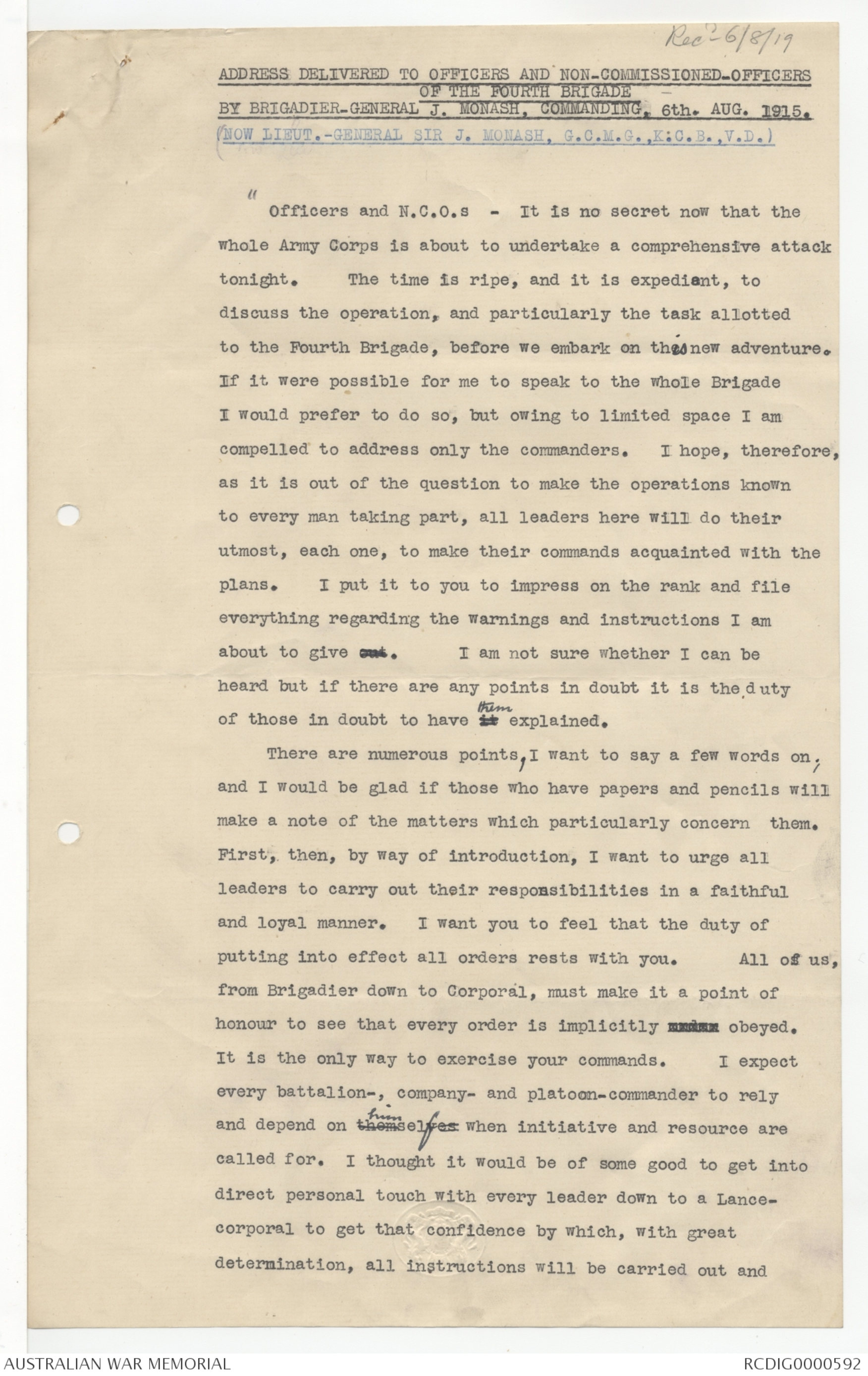
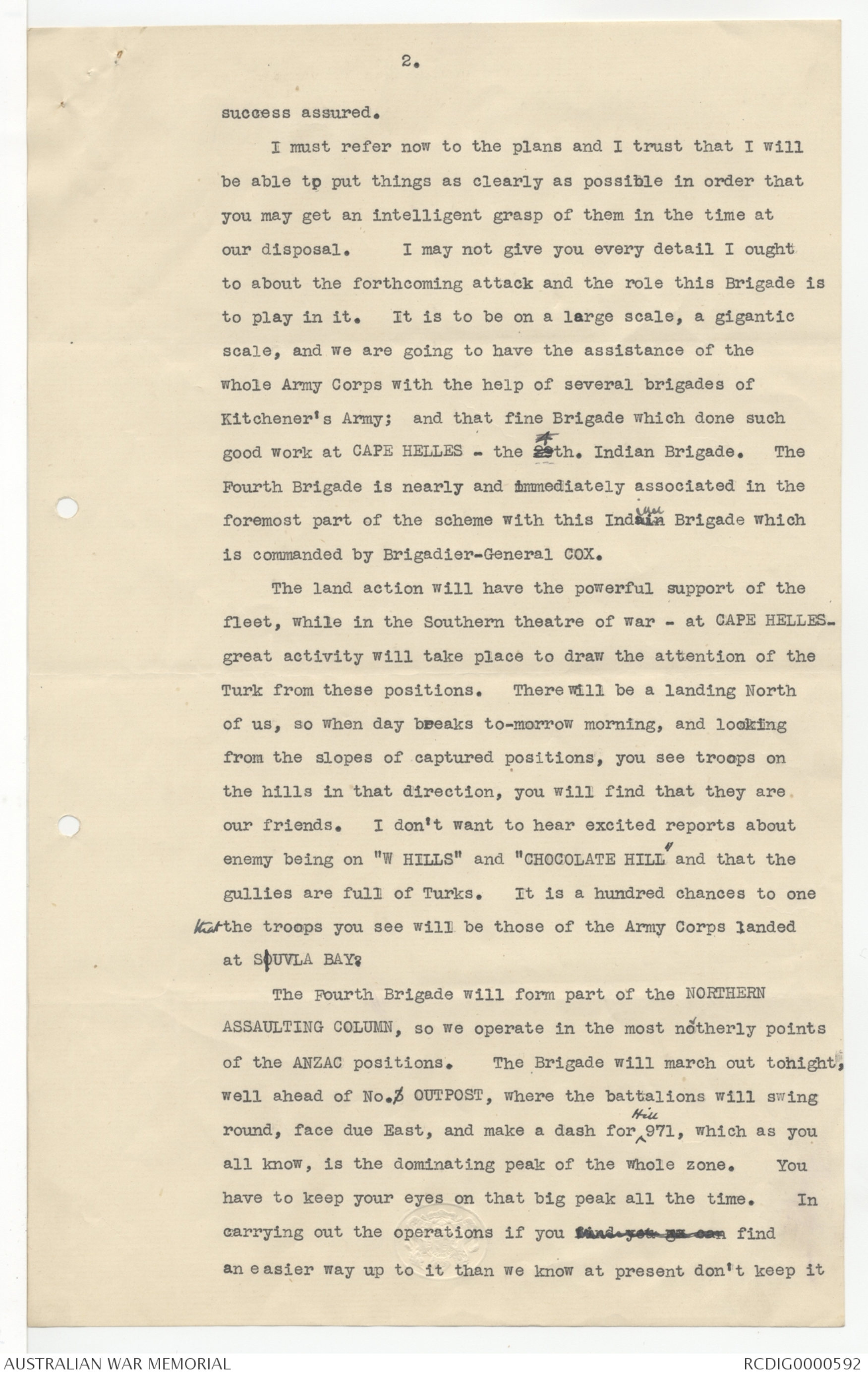
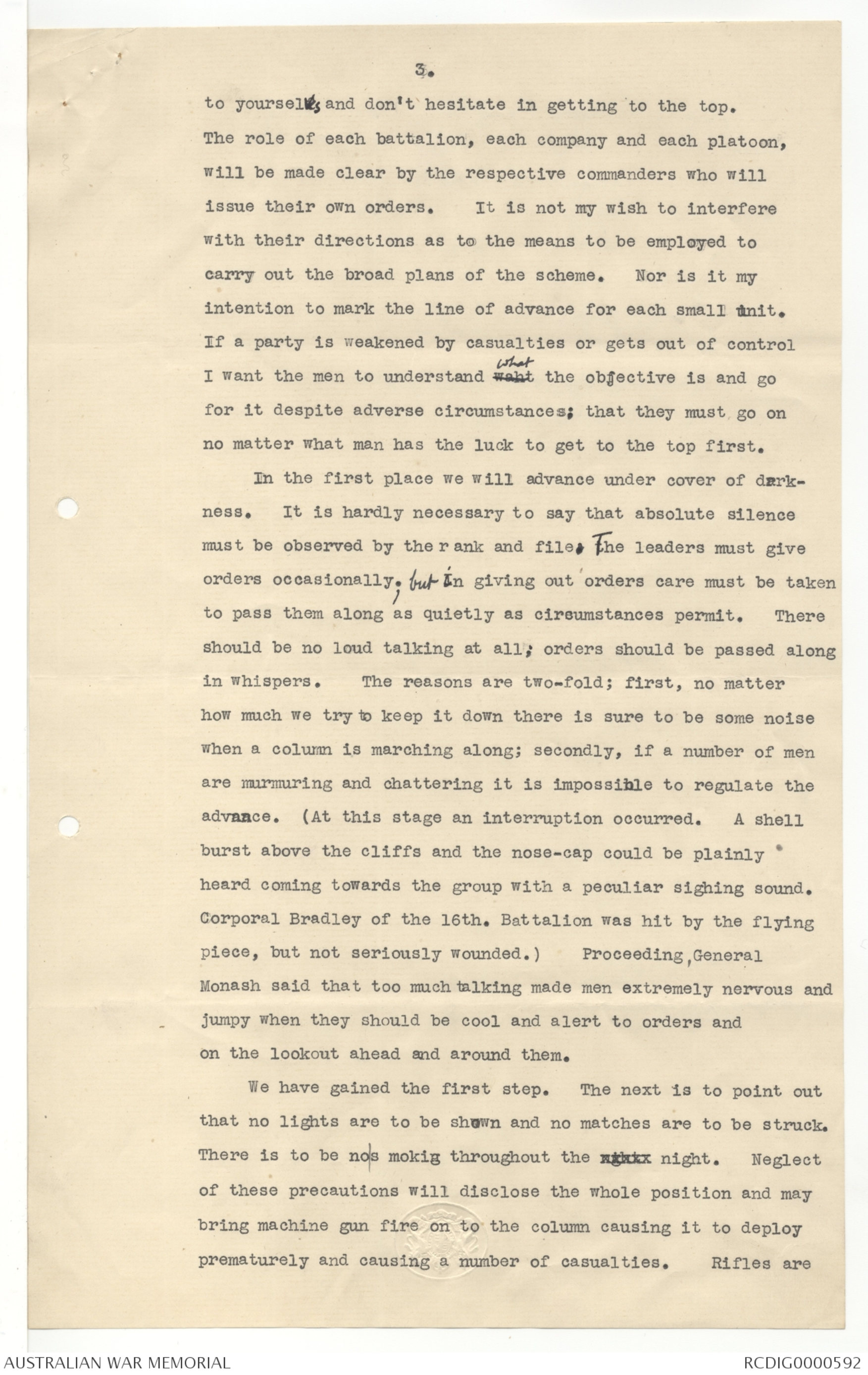
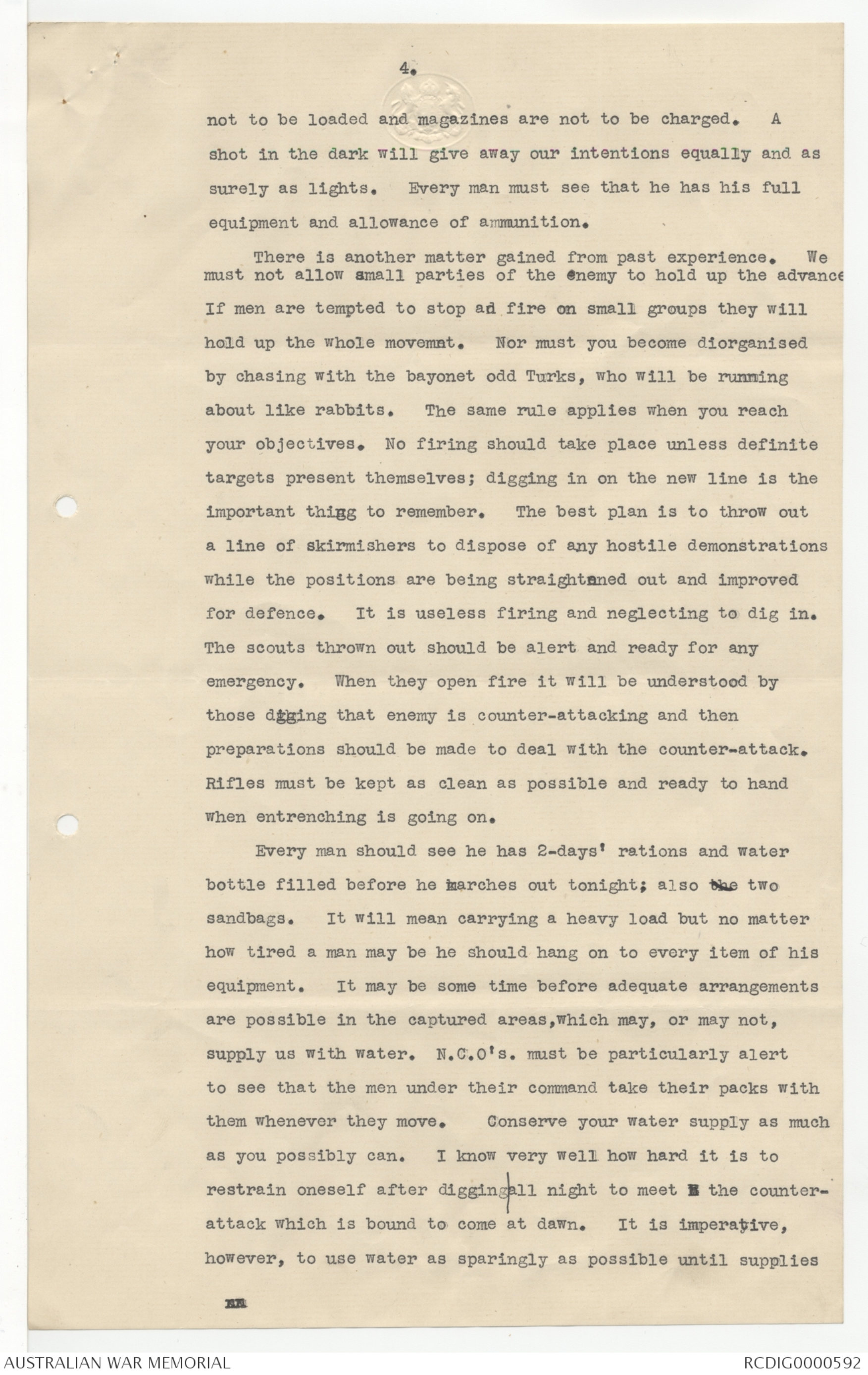
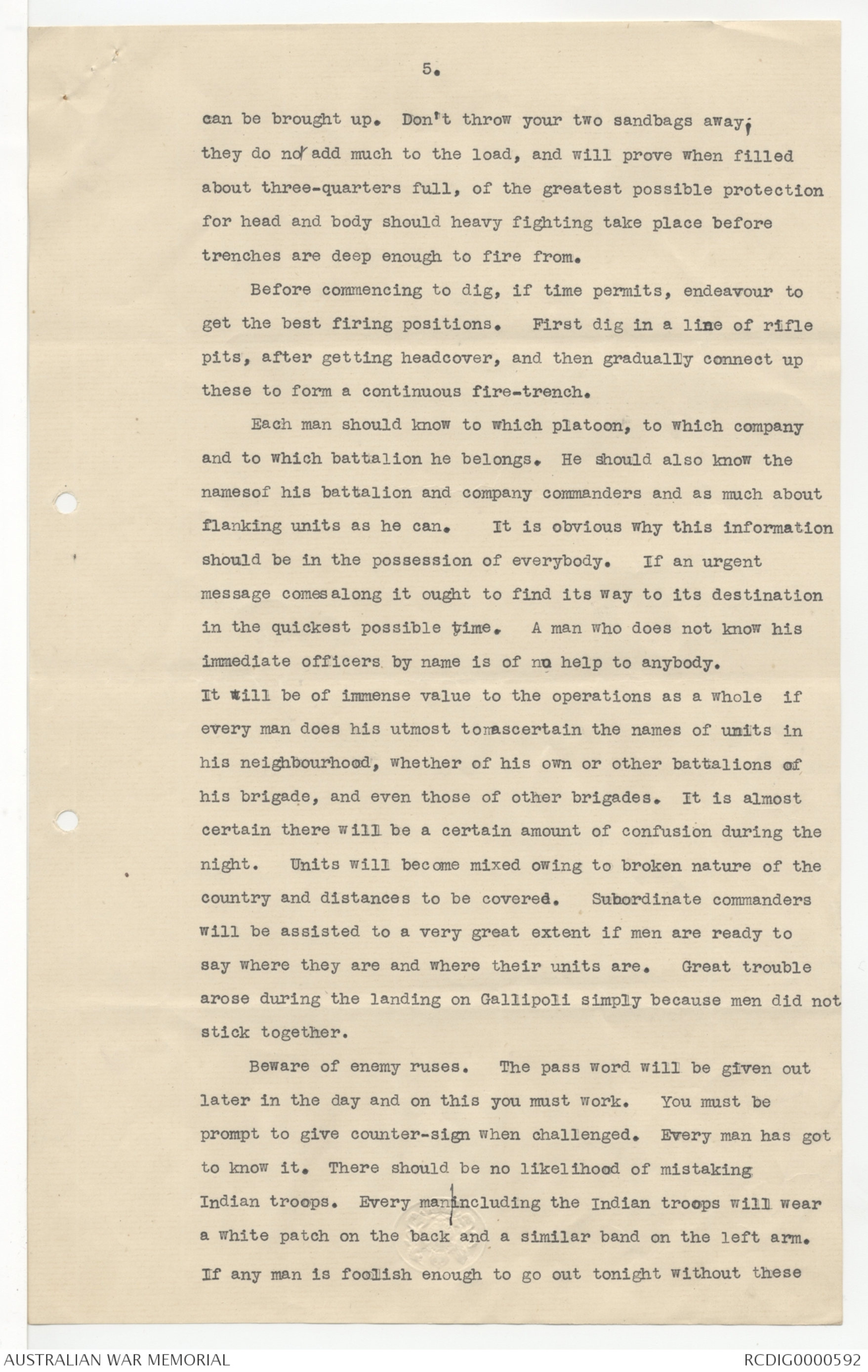
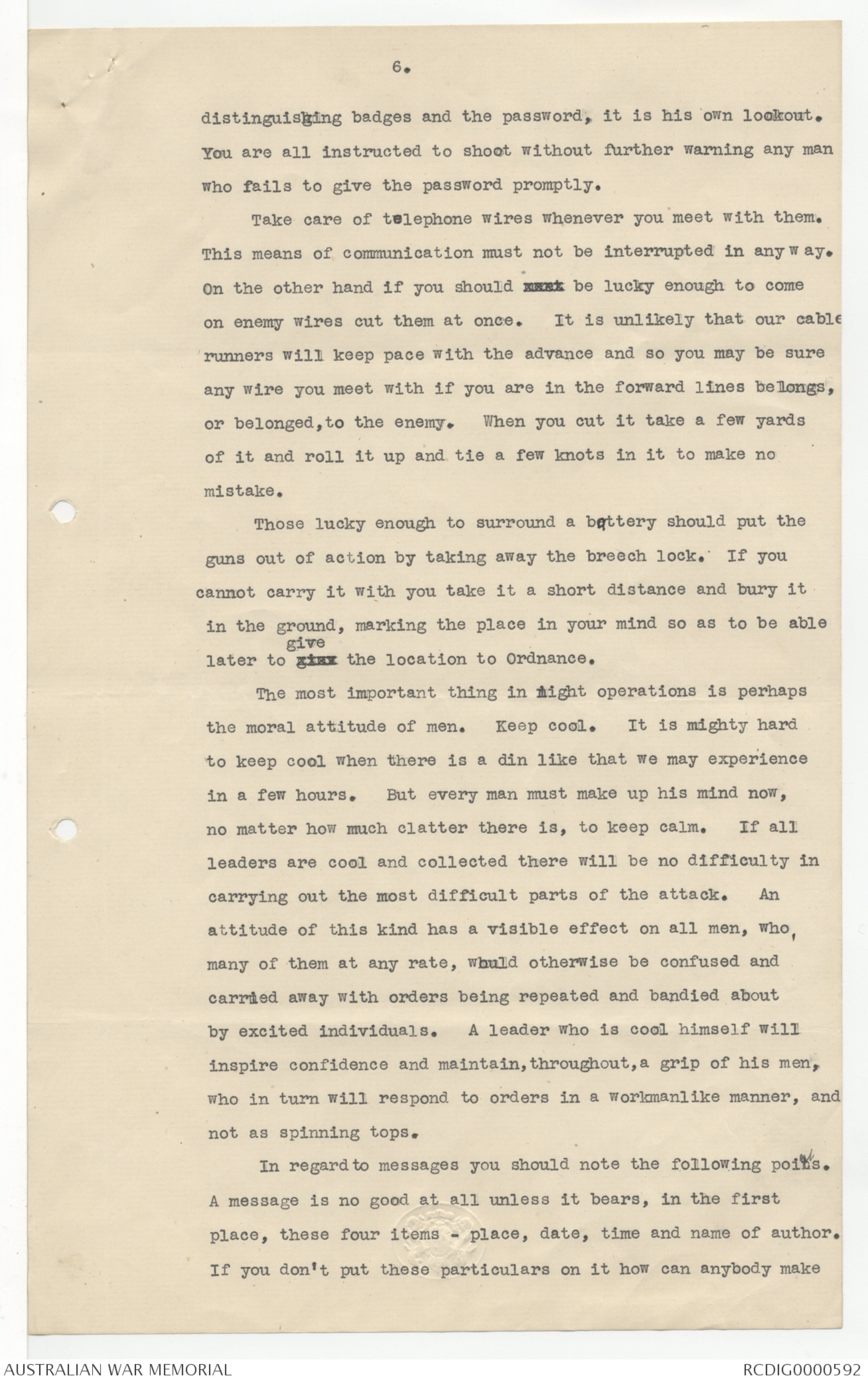
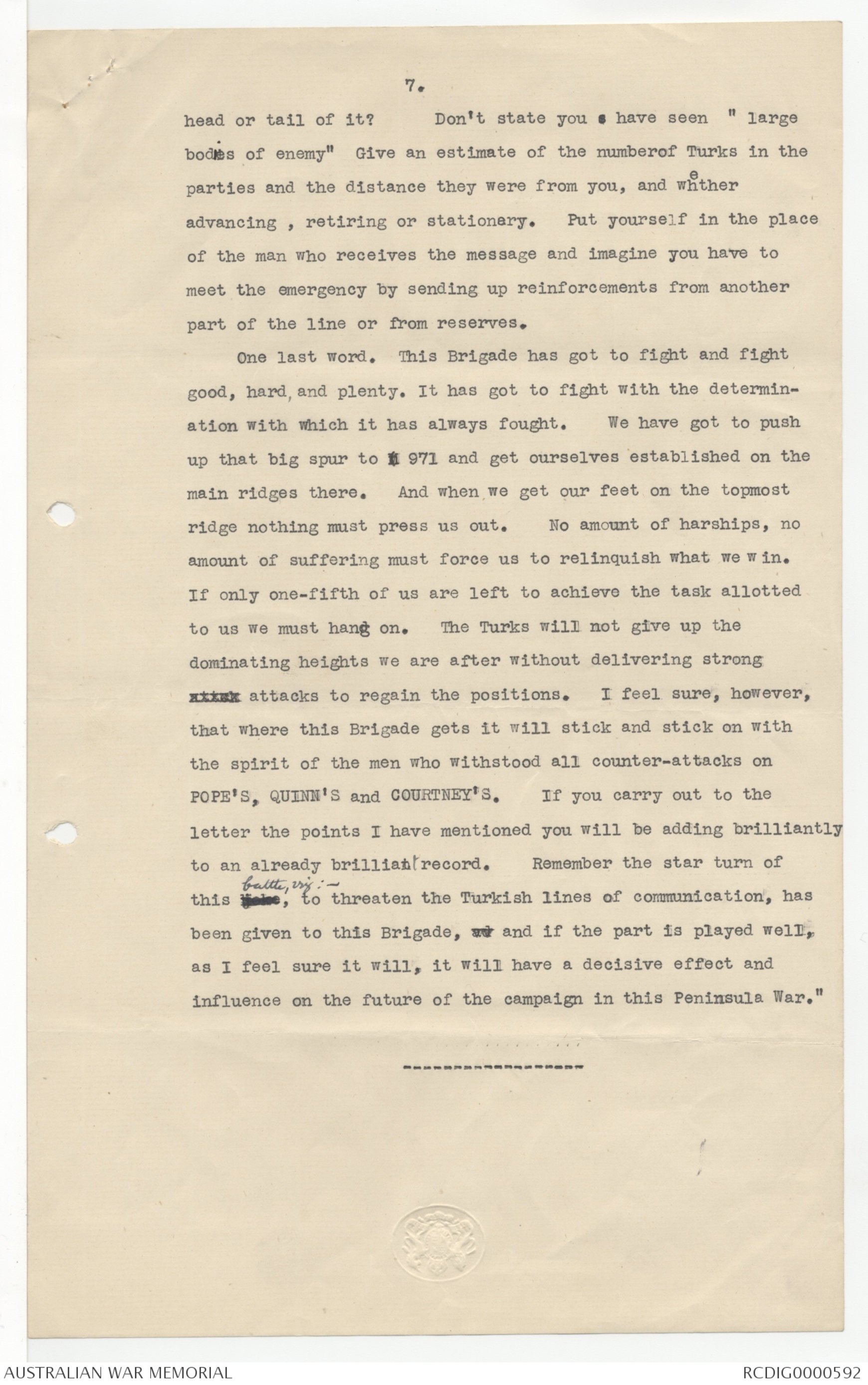
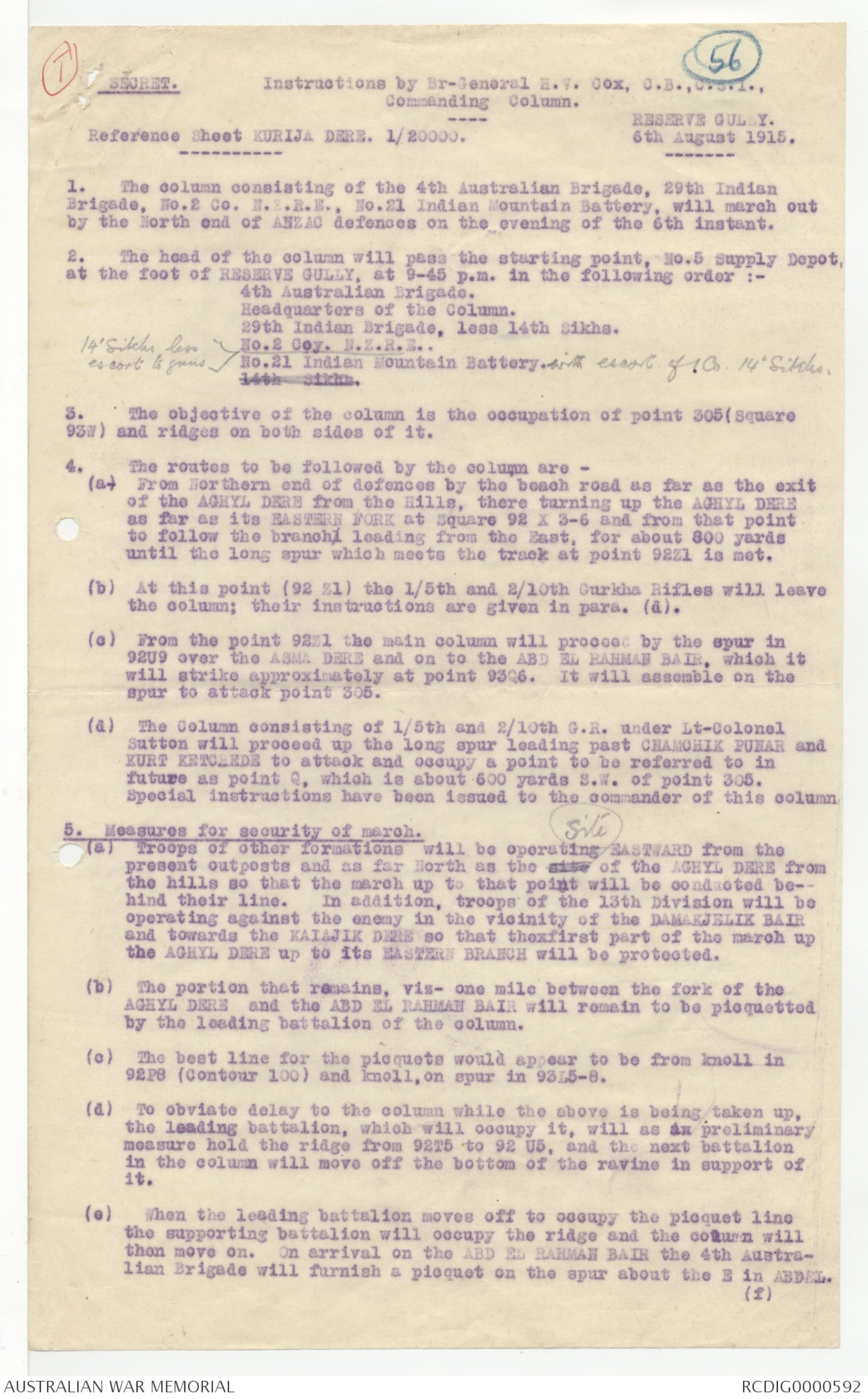
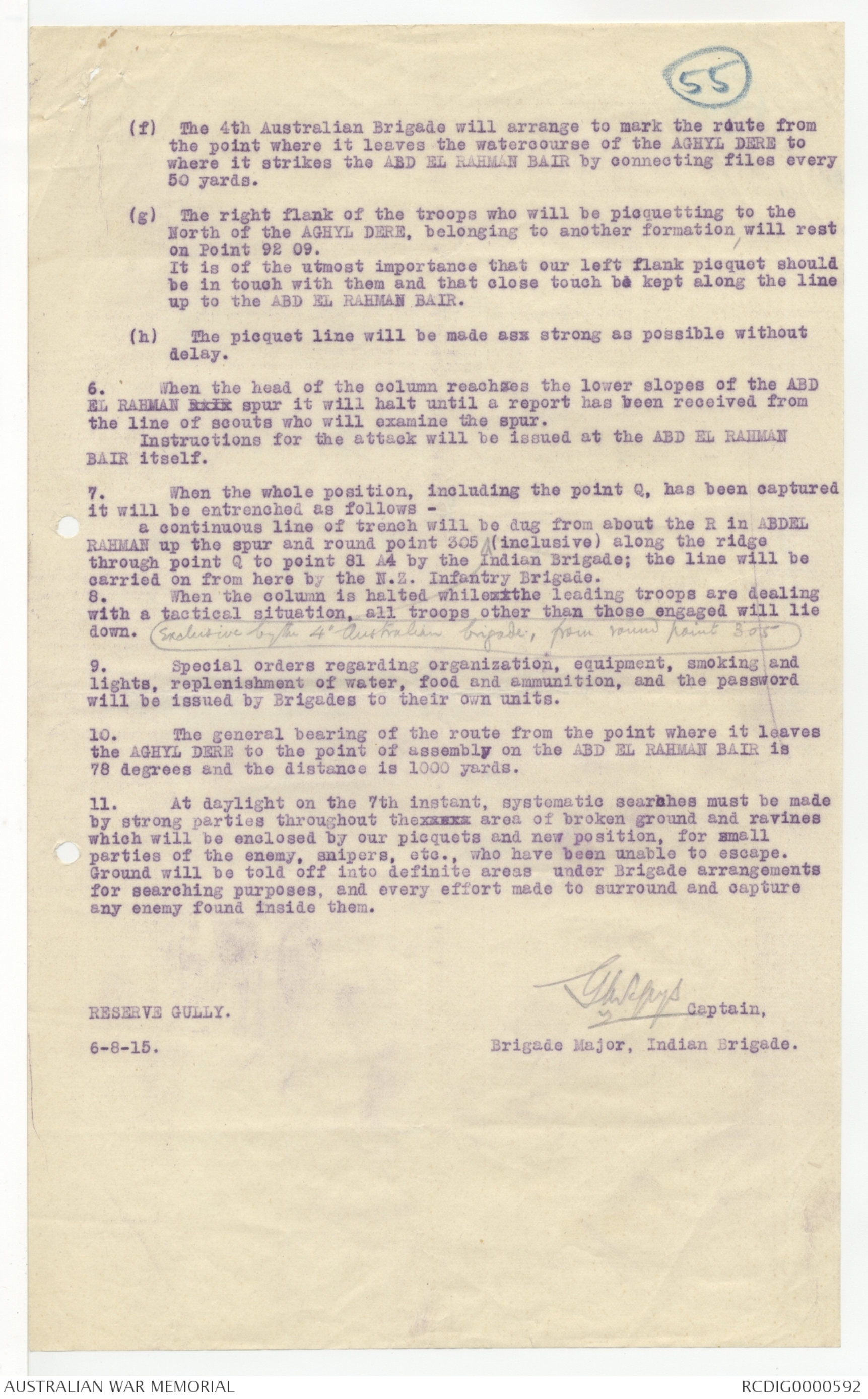
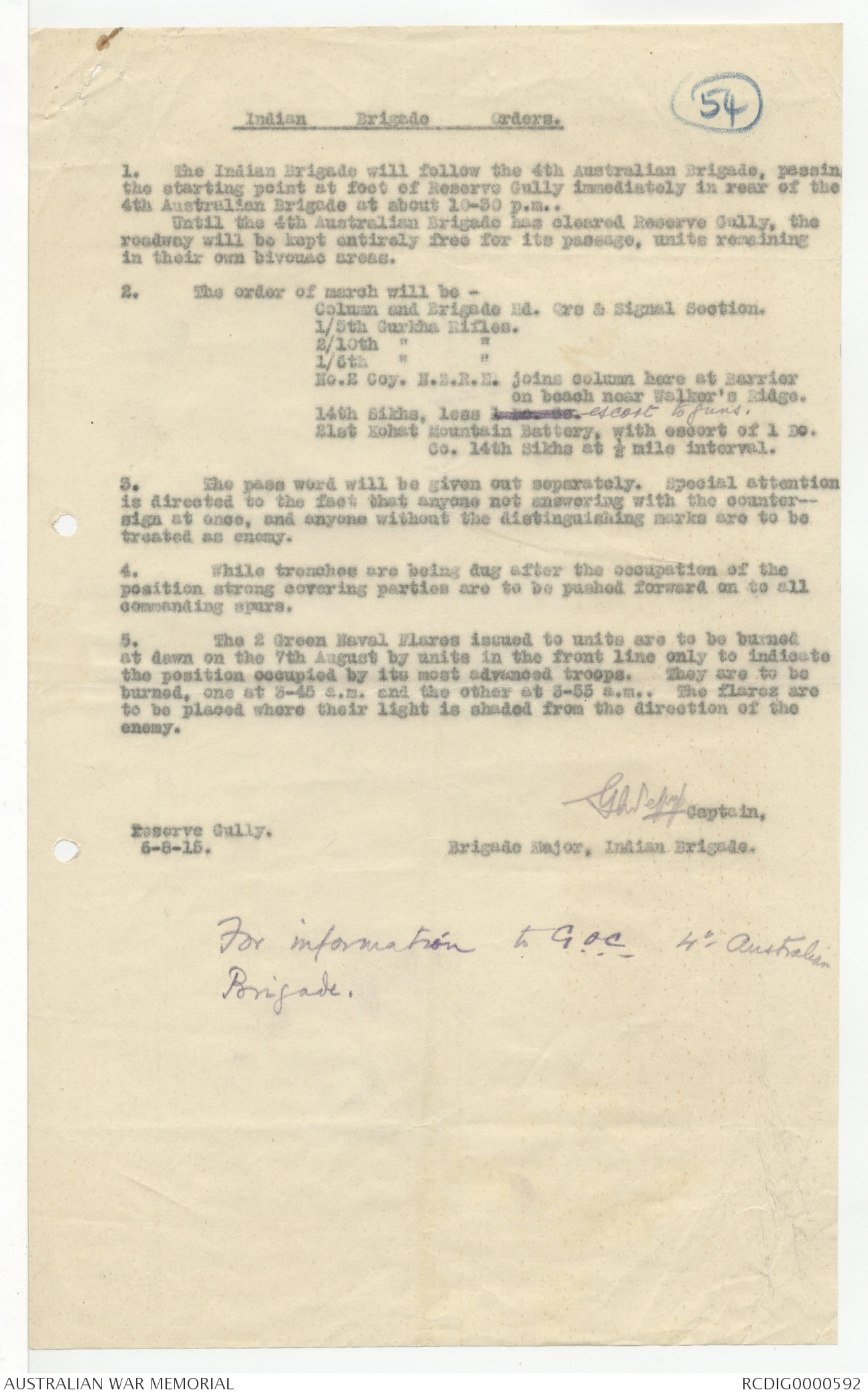
Rec'd 6/8/19
ADDRESS DELIVERED TO OFFICERS AND NON-COMMISSIONED-OFFICERS
OF THE FOURTH BRIGADE
BY BRIGADIER-GENERAL J. MONASH, COMMANDING, 6th. AUG. 1915.
(NOW LIEUT.-GENERAL SIR J. MOMASH, G.C.M.G.,K.C.B.,V.D.)
"Officers and N.C.O.s - It is no secret now that the
whole Army Corps is about to undertake a comprehensive attack
tonight. The time is ripe, and it is expedient, to
discuss the operation, and particularly the task allotted
to the Fourth Brigade, before we embark on this new adventure.
If it were possible for me to speak to the whole Brigade
I would prefer to do so, but owing to limited space I am
compelled to address only the commanders. I hope, therefore,
as it is out of the question to make the operations known
to every man taking part, all leaders here will do their
utmost, each one, to make their commands acquainted with the
plans. I put it to you to impress on the rank and file
everything regarding the warnings and instructions I am
about to give out. I am not sure whether I can be
heard but if there are any points in doubt it is the duty
of those in doubt to have them it explained.
There are numerous points, I want to say a few words on,
and I would be glad if those who have papers and pencils will
make a note of the matters which particularly concern them.
First, then, by way of introduction, I want to urge all
leaders to carry out their responsibilities in a faithful
and loyal manner. I want you to feel that the duty of
putting into effect all orders rests with you. All of us,
from Brigadier down to Corporal, must make it a point of
honour to see that every order is implicitly xxxxx obeyed.
It is the only way to exercise your commands. I expect
every battalion-, company- and platoon-commander to rely
and depend on themhimselfves when initiative and resource are
called for. I thought it would be of some good to get into
direct personal touch with every leader down to a Lance-
corporal to get that confidence by which, with great
determination, all instructions will be carried out and
2.
success assured.
I must refer now to the plans and I trust that I will
be able to put things as clearly as possible in order that
you may get an intelligent grasp of them in the time at
our disposal. I may not give you every detail I ought
to about the forthcoming attack and the role this Brigade is
to play in it. It is to be on a large scale, a gigantic
scale, and we are going to have the assistance of the
whole Army Corps with the help of several brigades of
Kitchener's Army; and that fine Brigade which done such
good work at CAPE HELLES - the 294th. Indian Brigade. The
Fourth Brigade is nearly and immediately associated in the
foremost part of the scheme with this Indainian Brigade which
is commanded by Brigadier-General COX.
The land action will have the powerful support of the
fleet, while in the Southern theatre of war - at CAPE HELLES..
great activity will take place to draw the attention of the
Turk from these positions. There will be a landing North
of us, so when day breaks to-morrow morning, and looking
from the slopes of captured positions, you see troops on
the hills in that direction, you will find that they are
our friends. I don't want to hear excited reports about
enemy being on "W HILLS" and "CHOCOLATE HILL" and that the
gullies are full of Turks. It is a hundred chances to one
that the troops you see will be those of the Army Corps landed
at SOUVLA BAY.
The Fourth Brigade will form part of the NORTHERN
ASSAULTING COLUMN, so we operate in the most northerly points
of the ANZAC positions. The Brigade will march out tonight,
well ahead of No.3 OUTPOST, where the battalions will swing
round, face due East, and make a dash for ^Hill 971, which as you
all know, is the dominating peak of the whole zone. You
have to keep your eyes on that big peak all the time. In
carrying out the operations if you find you ge can find
an easier way up to it than we know at present don't keep it
3.
to yourselfves and don't hesitate in getting to the top.
The role of each battalion, each company and each platoon,
will be made clear by the respective commanders who will
issue their own orders. It is not my wish to interfere
with their directions as to the means to be employed to
carry out the broad plans of the scheme. Nor is it my
intention to mark the line of advance for each small unit.
If a party is weakened by casualties or gets out of control
I want the men to understand what waht the objective is and go
for it despite adverse circumstances; that they must go on
no matter what man has the luck to get to the top first.
In the first place we will advance under cover of darkness.
It is hardly necessary to say that absolute silence
must be observed by the rank and file. The leaders must give
orders occasionally; but in giving out orders care must be taken
to pass them along as quietly as circumstances permit. There
should be no loud talking at all; orders should be passed along
in whispers. The reasons are two-fold; first, no matter
how much we try to keep it down there is sure to be some noise
when a column is marching along; secondly, if a number of men
are murmuring and chattering it is impossible to regulate the
advance. (At this stage an interruption occurred. A shell
burst above the cliffs and the nose-cap could be plainly
heard coming towards the group with a peculiar sighing sound.
Corporal Bradley of the 16th. Battalion was hit by the flying
piece, but not seriously wounded.) Proceeding,General
Monash said that too much talking made men extremely nervous and
jumpy when they should be cool and alert to orders and
on the lookout ahead and around them.
We have gained the first step. The next is to point out
that no lights are to be shown and no matches are to be struck.
There is to be no/s mokig throughout the nght night. Neglect
of these precautions will disclose the whole position and may
bring machine gun fire on to the column causing it to deploy
prematurely and causing a number of casualties. Rifles are
4.
not to be loaded and magazines are not to be charged. A
shot in the dark will give away our intentions equally and as
surely as lights. Every man must see that he has his full
equipment and allowance of ammunition.
There is another matter gained from past experience. We
must not allow small parties of the enemy to hold up the advance
If men are tempted to stop an fire on small groups they will
hold up the whole movemnt. Nor must you become diorganised
by chasing with the bayonet odd Turks, who will be running
about like rabbits. The same rule applies when you reach
your objectives. No firing should take place unless definite
targets present themselves; digging in on the new line is the
important thing to remember. The best plan is to throw out
a line of skirmishers to dispose of any hostile demonstrations
while the positions are being straightened out and improved
for defence. It is useless firing and neglecting to dig in.
The scouts thrown out should be alert and ready for any
emergency. When they open fire it will be understood by
those dgging that enemy is counter-attacking and then
preparations should be made to deal with the counter-attack.
Rifles must be kept as clean as possible and ready to hand
when entrenching is going on.
Every man should see he has 2-days' rations and water
bottle filled before he marches out tonight; also the two
sandbags. It will mean carrying a heavy load but no matter
how tired a man may be he should hang on to every item of his
equipment. It may be some time before adequate arrangements
are possible in the captured areas,which may, or may not,
supply us with water. N.C.O's. must be particularly alert
to see that the men under their command take their packs with
them whenever they move. Conserve your water supply as much
as you possibly can. I know very well how hard it is to
restrain oneself after digging|all night to meet the a counterattack
which is bound to come at dawn. It is imperative,
however, to use water as sparingly as possible until suppliesxx
5.
can be brought up. Don’t throw your two sandbags away;
they do not add much to the load, and will prove when filled
about three-quarters full, of the greatest possible protection
for head and body should heavy fighting take place before
trenches are deep enough to fire from.
Before commencing to dig, if time permits, endeavour to
get the best firing positions. First dig in a line of rifle
pits, after getting headcover, and then gradually connect up
these to form a continuous fire-trench.
Each man should know to which platoon, to which company
and to which battalion he belongs. He should also know the
namesof his battalion and company commanders and as much about
flanking units as he can. It is obvious why this information
should be in the possession of everybody. If an urgent
message comesalong it ought to find its way to its destination
in the quickest possible time. A man who does not know his
immediate officers by name is of no help to anybody.
It will be of immense value to the operations as a whole if
every man does his utmost to ascertain the names of units in
his neighbourhood, whether of his own or other battalions of
his brigade, and even those of other brigades. It is almost
certain there will be a certain amount of confusion during the
night. Units will become mixed owing to broken nature of the
country and distances to be covered. Subordinate commanders
will be assisted to a very great extent if men are ready to
say where they are and where their units are. Great trouble
arose during the landing on Gallipoli simply because men did not
stick together.
Beware of enemy ruses. The pass word will be given out
later in the day and on this you must work. You must be
prompt to give counter-sign when challenged. Every man has got
to know it. There should be no likelihood of mistaking
Indian troops. Every man|including the Indian troops will wear
a White patch on the back and a similar band on the left arm.
If any man is foolish enough to go out tonight without these
6.
distinguishing badges and the password, it is his own lookout.
You are all instructed to shoot without further warning any man
who fails to give the password promptly.
Take care of telephone wires whenever you meet with them.
This means of communication must not be interrupted in anyway.
On the other hand if you should be xxxx lucky enough to come
on enemy wires cut them at once. It is unlikely that our cable
runners will keep pace with the advance and so you may be sure
any wire you meet with if you are in the forward lines belongs,
or belonged,to the enemy. When you cut it take a few yards
of it and roll it up and tie a few knots in it to make no
mistake.
Those lucky enough to surround a battery should put the
guns out of action by taking away the breech lock. If you
cannot carry it with you take it a short distance and bury it
in the ground, marking the place in your mind so as to be able
later to give gixx the location to Ordnance.
The most important thing in night operations is perhaps
the moral attitude of men. Keep cool. It is mighty hard
to keep cool when there is a din like that we may experience
in a few hours. But every man must make up his mind now,
no matter how much clatter there is, to keep calm. If all
leaders are cool and collected there will be no difficulty in
carrying out the most difficult parts of the attack. An
attitude of this kind has a visible effect on all men, who,
many of them at any rate, would otherwise be confused and
carried away with orders being repeated and bandied about
by excited individuals. A leader who is cool himself will
inspire confidence and maintain,throughout,a grip of his men,
who in turn will respond to orders in a workmanlike manner, and
not as spinning tops.
In regard to messages you should note the following points.
A message is no good at all unless it bears, in the first
place, these four items - place, date, time and name of author.
If you don't put these particulars on it how can anybody make
7.
head or tail of it? Don't state you s have seen " large
bodies of enemy" Give an estimate of the numberof Turks in the
parties and the distance they were from you, and whether
advancing, retiring or stationery. Put yourself in the place
of the man who receives the message and imagine you have to
meet the emergency by sending up reinforcements from another
part of the line or from reserves.
One last word. This Brigade has got to fight and fight
good, hard, and plenty. It has got to fight with the determination
with which it has always fought. We have got to push
up that big spur to x 971 and get ourselves established on the
main ridges there. And when we get our feet on the topmost
ridge nothing must press us out. No amount of harships, no
amount of suffering must force us to relinquish what we win.
If only one-fifth of us are left to achieve the task allotted
to us we must hang on. The Turks will not give up the
dominating heights we are after without delivering strongxxxxx attacks to regain the positions. I feel sure, however,
that where this Brigade gets it will stick and stick on with
the spirit of the men who withstood all counter-attacks on
POPE'S, QUINN'S and COURTNEY'S. If you carry out to the
letter the points I have mentioned you will be adding brilliantly
to an already brilliant record. Remember the star turn of
this xxxx battle, viz:- to threaten the Turkish lines of communication, has
been given to this Brigade, xx and if the part is played well,
as I feel sure it will, it will have a decisive effect and
influence on the future of the campaign in this Peninsula War."
----------------------------
T 56
SECRET. Instructions by Br-General H.V. Cox, C.B., C.S.I.,
Commanding Column.
RESERVE GULLY.
6th August 1915.
Reference Sheet KURIJA DERE. 1/20000.
-------------
1. The column consisting of the 4th Australian Brigade, 29th Indian
Brigade, No.2 Co. N.Z.R.E., No.21 Indian Mountain Battery, will march out
by the North end of ANZAC defences on the evening of the 6th instant.
2. The head of the column will pass the starting point, No.5 supply Depot,
at the foot of RESERVE GULLY, at 9-45 p.m. in the following order:-
4th Australian Brigade.
Headquarters of the Column.
29th Indian Brigade, less 14th Sikhs.
No.2 Coy. N.Z.R.E..
14th Sikhs less
escort to guns
No. 21 Indian Mountain Battery. with escort of 1Co 14th Sikhs.14th Sikhs
3. The objective of the column is the occupation of point 305(square
93W) and ridges on both sides of it.
4. The routes to be followed by the column are -
(a) From Northern end of defences by the beach road as far as the exit
of the AGHYL DERE from the Hills, there turning up the AGHYL DERE
as far as its EASTERN FORK at square 92 X 3-6 and from that point
to follow the branchl leading from the East, for about 800 yards
until the long spur which meets the track at point 92Z1 is met.
(b) At this point (92 Z1) the 1/5th and 2/10th Gurkha Rifles will leave
the column; their instructions are given in para. (d).
(c) From the point 92Z1 the main column will procced by the spur in
92U9 over the ASMA DERE and on to the ABD EL RAHMAN BAIR, which it
will strike approximately at point 93Q6. It will assemble on the
spur to attack point 305.
(d) The Column consisting of 1/5th and 2/10th G.R. under Lt-Colonel
Sutton will proceed up the long spur leading past CHAMCHIK PUNAR and
KURT KETCHEDE to attack and occupy a point to be referred to in
future as point Q, which is about 600 yards S.W. of point 305.
Special instructions have been issued to the commander of this column
5. Measures for security of march.
(a) Troops of other formations will be operating EASTWARD from the
present outposts and as far North as the site Site of the AGHYL DERE from
the hills so that the march up to that point will be conducted behind
their line. In addition, troops of the 13th Division will be
operating against the enemy in the vicinity of the DAMAKJELIK BAIR
and towards the KAIAJIK DERE so that thexfirst part of the march up
the AGHYL DERE up to its EASTERN BRANCH will be protected.
(b) The portion that remains, viz- one mile between the fork of the
AGHYL DERE and the ABD EL RAHMAN BAIR will remain to be picquetted
by the leading battalion of the column.
(c) The best line for the picquets would appear to be from knoll in
92P8 (Contour 100) and knoll, on spur in 93L5-8.
(d) To obviate delay to the column while the above is being taken up,
the leading battalion, which will occupy it, will as ax preliminary
measure hold the ridge from 92T5 to 92 U5, and the next battalion
in the column will move off the bottom of the ravine in support of
it.
(e) When the leading battalion moves off to occupy the picquet line
the supporting battalion will occupy the ridge and the column will
then move on. On arrival on the ABD EL RAHMAN BAIR the 4th Australian
Brigade will furnish a picquet on the spur about the E in ABDEL.
(f)
55
(f) The 4th Australian Brigade will arrange to mark the route from
the point where it leaves the watercourse of the AGHYL DERE to
where it strikes the ABD EL RAHMAN BAIR by connecting files every
50 yards.
(g) The right flank of the troops who will be picquetting to the
North of the AGHYL DERE, belonging to another formation will rest
on Point 92 O9.
It is of the utmost importance that our left flank picquet should
be in touch with them and that close touch be kept along the line
up to the ABD EL RAHMAN BAIR.
(h) The picquet line will be made asx strong as possible without
delay.
6. When the head of the column reachses the lower slopes of the ABD
EL RAHMAN BAIR spur it will halt until a report has been received from
the line of scouts who will examine the spur.
Instructions for the attack will be issued at the ABD EL RAHMAN
BAIR itself.
7. When the whole position, including the point Q, has been captured
it will be entrenched as follows -
a continuous line of trench will be dug from about the R in ABDEL
RAHMAN up the spur and round point 305 ^Exclusive by the 4th Australian brigade, from round point 305 (inclusive) along the ridge
through point Q to point 81 A4 by the Indian Brigade; the line will be
carried on from here by the N.Z. Infantry Brigade.
8. When the column is halted whilexxthe leading troops are dealing
with a tactical situation, all troops other than those engaged will lie
down.
9. Special orders regarding organization, equipment, smoking and
lights, replenishment of water, food and ammunition, and the password
will be issued by Brigades to their own units.
10. The general bearing of the route from the point where it leaves
the AGHYL DERE to the point of assembly on the ABD EL RAHMAN BAIR is
78 degrees and the distance is 1000 yards.
11. At daylight on the 7th instant, systematic searches must be made
by strong parties throughout thexxxx area of broken ground and ravines
which will be enclosed by our picquets and new position, for small
parties of the enemy, snipers, etc., who have been unable to escape.
Ground will be told off into definite areas under Brigade arrangements
for searching purposes, and every effort made to surround and capture
any enemy found inside them.
[[GW ?]] Captain,
Brigade Major, Indian Brigade.
RESERVE GULLY.
6-8-15.
54
Indian Brigade Orders.
1. The Indian Brigade will follow the 4th Australian Brigade, passing
the starting point at foot of Reserve Gully immediately in rear of the
4th Australian Brigade at about 10-30 p.m..
Until the 4th Australian Brigade has cleared Reserve Gully, the
roadway will be kept entirely free for its passage, units remaining
in their own bivouac areas.
2. The order of march will be -
Column and Brigade Bd. Qrs & Signal Section.
1/5th Gurkha Rifles.
2/10th " "
1/6th " "
No.2 Coy. N.Z.R.E. joins column here at Barrier
on beach near Walker's Ridge.
14th Sikhs, less 1 Do. Co. escort to guns.
2lst Kohat Mountain Battery, with escort of 1 Do.
Co. 14th Sikhs at 1/2 mile interval.
3. The pass word will be given out separately. Special attention
is directed to the fact that anyone not answering with the countersign
at once, and anyone without the distinguishing marks are to be
treated as enemy.
4. While trenches are being dug after the occupation of the
position strong covering parties are to be pushed forward on to all
commanding spurs.
5. The 2 Green Naval Flares issued to units are to be burned
at dawn on the 7th August by units in the front line only to indicate
the position occupied by its most advanced troops. They are to be
burned, one at 3-45 a.m. and the other at 3-55 a.m.. The flarez are
to be placed where their light is shaded from the direction of the
enemy.
[[G W ?]] Captain,
Brigade Major, Indian Brigade.
RESERVE GULLY.
6-8-15.
For information to G.O.C. 4th Australian
Brigade.
 Deb Parkinson
Deb ParkinsonThis transcription item is now locked to you for editing. To release the lock either Save your changes or Cancel.
This lock will be automatically released after 60 minutes of inactivity.